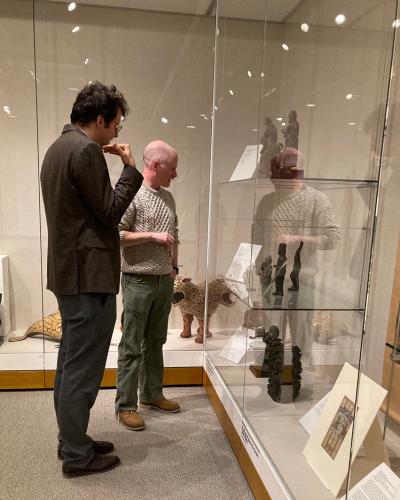“Where’s your spine?” we often say to those who seem to lack moral ‘backbone’. How do such vertical metaphors affect our imagination of refusal? On Thursday, October 25, Cornell presents “Bartleby or the Bacchae? Toward a Feminist Theory of Refusal,” a talk by Bonnie Honig, Nancy Duke Lewis Professor of Modern Culture & Media and Political Science at Brown University, examining representations of refusal across texts and images, from Antigone to da Vinci. The 4:30 pm talk will take place in Lewis Auditorium, Goldwin Smith Hall, with a reception following at the A.D. White House. The event is free and the public is invited. The talk is co-sponsored by Cornell Jewish Studies Program.
In her talk, Honig will examine our cultural assumption that refusal is associated with vertical postures, while postures of inclination (or leaning in) are associated with maternal care. Honig will draw on Italian feminist philosopher Adriana Cavarero’s Inclinations, which theorizes an open, altruistic feminine subject in opposition to the upright masculine subject. Honig expands this inclined, feminine subject by analyzing postures of refusal in Antigone, the Bacchae, Thoreau’s “Walking", and Leonardo da Vinci’s painting of the Madonna. Honig argues that “refusals we find in maternal and sororal care express not only love but rage, and promise not only the holding of community but also the dismemberment of revolution and new beginning.”
Honig works at the intersection of political theory and cultural studies, exploring how inheritances of languages, imagery, and texts enable our defense of just institutions or our imagined alternatives to unjust systems. She focuses especially on “received scrips” – for example, not just the text of Antigone, but its afterlives in feminist theory, continental philosophy, film, and popular culture – and their roles in politics and public life.
Honig is the author of Political Theory and the Displacement of Politics (Cornell, 1993), Democracy and the Foreigner (Princeton, 2001), Emergency Politics: Paradox, Law, Democracy (Princeton, 2009), Antigone, Interrupted (Cambridge University Press, 2013), and Public Things: Democracy in Disrepair, (Fordham University Press, 2017). She has edited or co-edited Feminist Interpretations of Hannah Arendt (Penn State, 1995), Skepticism, Individuality and Freedom: The Reluctant Liberalism of Richard Flathman (Minnesota, 2002), the Oxford Handbook of Political Thought (Oxford, 2006), and Politics, Theory, and Film: Critical Encounters with Lars von Trier (Oxford, 2016).
Visiting Cornell as one of the Invited Scholars during the 2018-19 year focused on “Authority,” Honig will also spend time presenting her recent work to the Society’s Fellows, as well as hold an intimate seminar with Cornell graduate students on the topic of refusal in Melville’s story “Bartleby, the Scrivener” (interested graduate students may contact Emily Parsons, elp25@cornell.edu).





